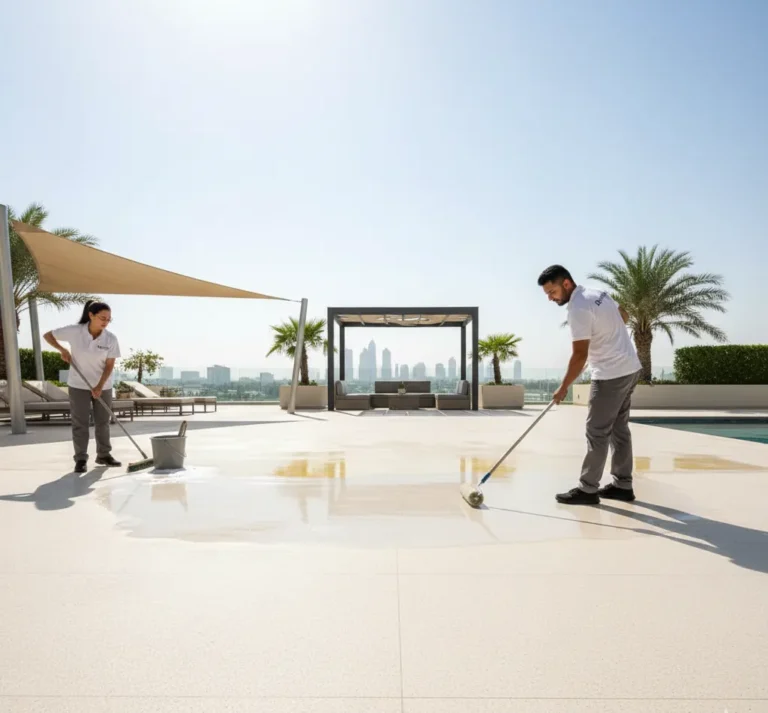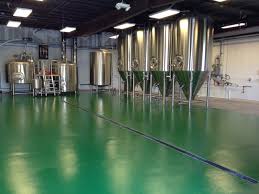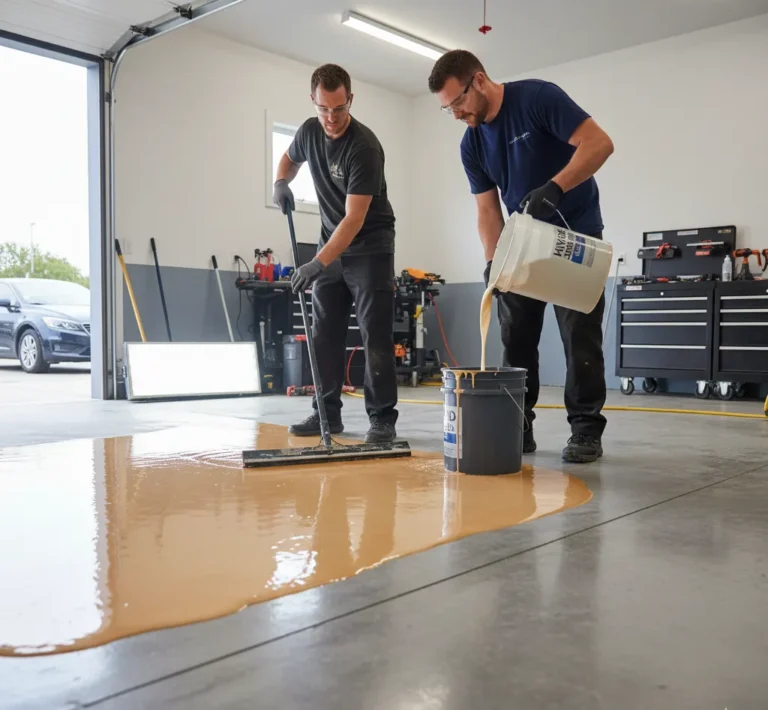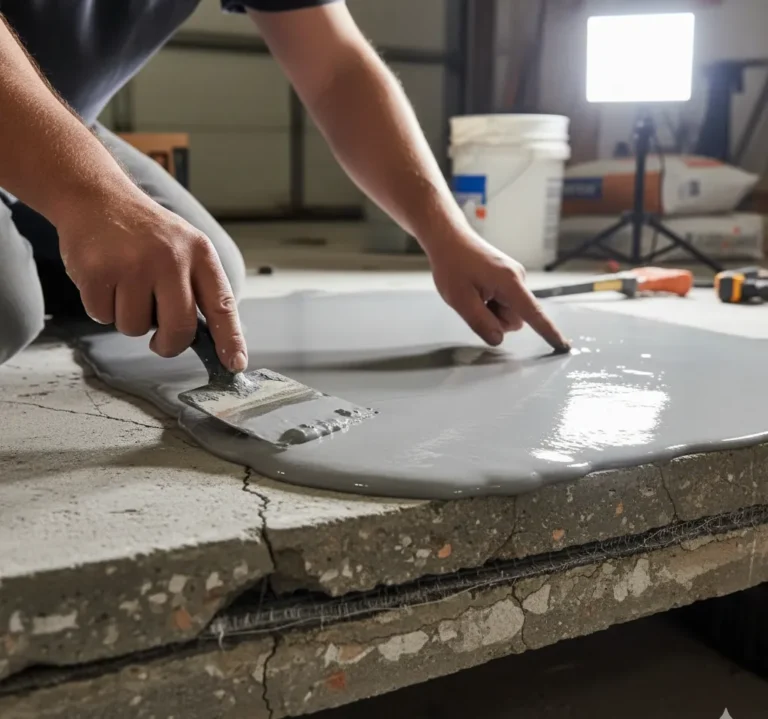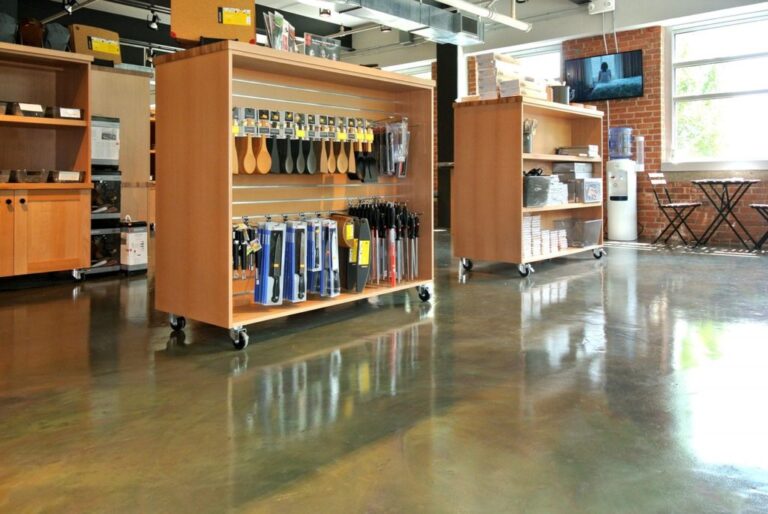Introduction to Epoxy Floor Coatings
Epoxy floor coatings have become a popular choice for both residential and commercial spaces due to their durability and aesthetic appeal. These coatings are made from a combination of resin and hardener, which, when mixed, create a rigid plastic material that bonds exceptionally well to most base layers. This results in a surface that is not only visually appealing but also highly resistant to wear and tear. Whether you’re looking to upgrade your garage floor or enhance the look of a commercial space, understanding the different types of epoxy floor coatings can help you make an informed decision.
Types of Epoxy Floor Coatings
Self-Leveling Epoxy Coatings
Self-leveling epoxy coatings are designed to create a smooth, seamless surface over new, old, cracked, or damaged concrete floors. These coatings are ideal for areas where a clean and polished look is desired. The self-leveling nature of this epoxy allows it to flow and settle into an even layer, making it perfect for spaces that require a flawless finish.
- Ideal for commercial kitchens, dining rooms, and warehouses.
- Provides a high-gloss finish that enhances the aesthetic appeal.
- Easy to clean and maintain due to its seamless nature.
Epoxy Mortar Coatings
Epoxy mortar coatings are the most robust of all epoxy floor systems. Composed of 100% solid epoxies and graded sand or quartz sand, these coatings are perfect for areas that require a floor that can withstand heavy loads and impact. They are often used in industrial environments where durability is a top priority.
- Suitable for manufacturing plants, mechanical rooms, and warehouses.
- Offers excellent resistance to chemical spills and abrasions.
- Can be used to repair cracks before applying other epoxy coatings.
Epoxy Flake Coatings
Epoxy flake coatings incorporate colored flakes or chips into the epoxy to create a vibrant, multi-hued finish. This type of coating is not only decorative but also provides a slightly textured surface that helps prevent slips and falls. It’s a popular choice for both residential and commercial spaces looking to add a bit of flair to their floors.
- Available in a variety of colors and patterns.
- Provides a slip-resistant surface.
- Ideal for garages, showrooms, and sports venues.
Epoxy Quartz Coatings
Epoxy quartz coatings are a combination of high-performance epoxy polymer resin and stained quartz grains. This type of coating is used for decorative spaces that require a durable and slip-resistant surface. The quartz grains add a unique texture and color to the floor, making it both functional and aesthetically pleasing.
- Perfect for locker rooms, restrooms, and schools.
- Offers a high level of slip resistance.
- Highly durable and resistant to heavy foot traffic.
Anti-Static Epoxy Coatings
Anti-static epoxy coatings are designed to reduce static electricity in environments where it can be hazardous. These coatings are essential in areas where sensitive electronic equipment is used, as they help prevent static discharge that could damage the equipment.
- Used in laboratories, hospitals, and electronic manufacturing facilities.
- Helps protect sensitive equipment from static damage.
- Provides a safe working environment by reducing static electricity.
Benefits of Epoxy Flooring Systems
Durability and Longevity
Epoxy flooring systems are renowned for their durability and long lifespan. Once applied, these coatings can last for decades without peeling or cracking, making them a cost-effective flooring solution.
- Resistant to heavy foot and vehicle traffic.
- Withstands impacts and abrasions.
- Long-lasting with minimal maintenance.
Chemical and Stain Resistance
One of the standout features of epoxy flooring is its resistance to chemicals and stains. This makes it an excellent choice for environments where spills are common.
- Protects against oil, gasoline, and other chemicals.
- Easy to clean and maintain.
- Prevents stains from penetrating the surface.
Easy Maintenance and Cleaning
Epoxy floors are incredibly easy to maintain. Their seamless surface means that dirt and debris can be easily swept away, and spills can be quickly wiped up without leaving a stain.
- Requires minimal cleaning effort.
- Resistant to mold and bacteria growth.
- Maintains its shine with regular cleaning.
Epoxy Flooring Applications
Industrial Facilities
Epoxy flooring is a staple in industrial facilities due to its ability to withstand heavy machinery and constant foot traffic. Its durability ensures that it can handle the demands of an industrial environment without deteriorating.
- Ideal for factories, warehouses, and production plants.
- Provides a safe and slip-resistant surface.
- Resistant to chemical spills and abrasions.
Commercial Spaces
In commercial spaces, epoxy flooring offers both functionality and aesthetic appeal. Its sleek finish can enhance the look of any retail or office space while providing a durable surface that can handle high foot traffic.
- Suitable for retail stores, offices, and showrooms.
- Enhances the visual appeal of the space.
- Easy to clean and maintain.
Residential Areas
For residential areas, epoxy flooring is often used in garages, basements, and even kitchens. Its resistance to stains and spills makes it a practical choice for homes.
- Perfect for garages, basements, and kitchens.
- Provides a clean and polished look.
- Resistant to household spills and stains.
Epoxy Floor Coating Installation Process
Surface Preparation
Proper surface preparation is crucial for the successful installation of epoxy floor coatings. This involves cleaning the floor thoroughly and repairing any cracks or damage to ensure a smooth application.
- Clean the floor to remove dirt and debris.
- Repair cracks and imperfections.
- Ensure the surface is dry and free of moisture.
Primer Application
Applying a primer is the next step in the installation process. The primer helps the epoxy adhere better to the surface, ensuring a long-lasting finish.
- Apply a thin layer of primer to the prepared surface.
- Allow the primer to dry completely.
- Ensures better adhesion of the epoxy coating.
Epoxy Application
Once the primer has dried, the epoxy coating can be applied. This involves mixing the resin and hardener and spreading it evenly over the surface.
- Mix the epoxy resin and hardener according to instructions.
- Apply the epoxy evenly using a roller or squeegee.
- Allow the epoxy to settle and self-level.
Curing and Finishing
After the epoxy has been applied, it needs time to cure. This process can take several days, depending on the type of epoxy used and the environmental conditions.
- Allow the epoxy to cure for the recommended time.
- Avoid walking on the surface until fully cured.
- Apply a topcoat for added protection and shine.
Choosing the Right Epoxy Floor Coating
Factors to Consider
When choosing an epoxy floor coating, several factors need to be considered to ensure you select the right product for your needs. These include the intended use of the space, the level of foot or vehicle traffic, and the desired aesthetic.
- Consider the environment and usage of the space.
- Evaluate the level of traffic and potential wear.
- Determine the desired look and finish.
Professional Consultation
Consulting with a professional can help you make an informed decision about the best epoxy floor coating for your needs. Professionals can assess your space and recommend the most suitable product based on your requirements.
- Seek advice from experienced epoxy flooring professionals.
- Get recommendations based on your specific needs.
- Ensure proper installation for optimal results.
Epoxy Floor Coating Finishes
Metallic Epoxy Flooring
Metallic epoxy flooring is a unique and visually stunning option that creates a three-dimensional, marble-like effect. This finish is achieved by adding metallic pigments to the epoxy, resulting in a floor that is both durable and eye-catching.
- Creates a luxurious, high-gloss finish.
- Available in a variety of colors and effects.
- Ideal for showrooms, galleries, and high-end spaces.
Solid Color Epoxy Flooring
Solid color epoxy flooring offers a clean and uniform look, making it a popular choice for both commercial and residential spaces. This finish is available in a wide range of colors, allowing you to customize the look of your floor.
- Provides a sleek and modern appearance.
- Available in numerous color options.
- Suitable for garages, basements, and commercial spaces.
Decorative Flake Systems
Decorative flake systems incorporate colored flakes into the epoxy to create a textured and visually appealing surface. This finish is not only decorative but also provides added slip resistance.
- Offers a unique and customizable look.
- Provides a slip-resistant surface.
- Ideal for garages, workshops, and recreational areas.
Maintenance and Care for Epoxy Floor Coatings
Regular Cleaning Techniques
Maintaining an epoxy floor is relatively simple, thanks to its seamless and non-porous surface. Regular cleaning can help preserve the floor’s appearance and prevent damage.
- Sweep or vacuum regularly to remove dirt and debris.
- Use a mild detergent and water for routine cleaning.
- Avoid using harsh chemicals that can damage the surface.
Addressing Scratches and Damages
While epoxy floors are highly durable, they can still be susceptible to scratches and damage. Addressing these issues promptly can help maintain the floor’s appearance and integrity.
- Use a soft cloth to buff out minor scratches.
- Repair deeper scratches with an epoxy repair kit.
- Avoid dragging heavy objects across the floor.
Environmental Impact of Epoxy Floor Coatings
VOC Content
Volatile organic compounds (VOCs) are a concern with many flooring products, but epoxy coatings are available in low-VOC formulations. These options are more environmentally friendly and safer for indoor air quality.
- Choose low-VOC epoxy products for a healthier environment.
- Reduces the impact on indoor air quality.
- Safer for both installers and occupants.
Sustainability Factors
Epoxy flooring can contribute to sustainability efforts by reducing the need for frequent replacements. Its long lifespan and durability make it a more sustainable choice compared to other flooring options.
- Long-lasting and reduces the need for replacement.
- Can be applied over existing floors, reducing waste.
- Contributes to sustainable building practices.
Cost Considerations for Epoxy Floor Coatings
Initial Investment
The initial cost of epoxy flooring can vary depending on the type of epoxy used and the size of the area being covered. While the upfront cost may be higher than other flooring options, the long-term benefits often outweigh the initial investment.
- Costs vary based on the type of epoxy and area size.
- Higher initial cost compared to some flooring options.
- Long-term savings due to durability and low maintenance.
Long-Term Value
Epoxy flooring offers excellent long-term value due to its durability and low maintenance requirements. Over time, the cost savings from reduced repairs and replacements can make epoxy flooring a cost-effective choice.
- Durable and requires minimal maintenance.
- Reduces the need for frequent repairs and replacements.
- Offers excellent value over the lifespan of the floor.
Comparing Epoxy Flooring to Other Flooring Options
Epoxy vs. Polished Concrete
Epoxy flooring and polished concrete are both popular choices for industrial and commercial spaces. While both offer durability and a sleek appearance, epoxy provides a more customizable finish with a variety of colors and textures.
- Epoxy offers more design options and finishes.
- Polished concrete is more cost-effective for large areas.
- Both options provide durability and low maintenance.
Epoxy vs. Polyurethane Coatings
Epoxy and polyurethane coatings are often compared due to their similar applications. While epoxy is known for its hardness and durability, polyurethane offers more flexibility and UV resistance, making it suitable for areas with temperature fluctuations.
- Epoxy is harder and more durable.
- Polyurethane offers better UV resistance.
- Both are suitable for high-traffic areas.
Common Misconceptions About Epoxy Floor Coatings
There are several misconceptions about epoxy floor coatings that can lead to confusion. One common myth is that epoxy floors are slippery, but in reality, they can be made slip-resistant with the addition of texture or anti-slip additives. Another misconception is that epoxy floors are only suitable for industrial spaces, but they are also an excellent choice for residential and commercial areas.
Advancements in Epoxy Floor Coating Technology
UV-Resistant Formulations
Recent advancements in epoxy technology have led to the development of UV-resistant formulations. These products are designed to withstand sunlight exposure, making them suitable for outdoor applications.
- UV-resistant epoxies prevent yellowing and degradation.
- Suitable for outdoor use and areas with sunlight exposure.
- Provides long-lasting protection and durability.
Rapid-Cure Systems
Rapid-cure epoxy systems have been developed to reduce the downtime associated with traditional epoxy installations. These systems cure quickly, allowing for faster project completion and minimal disruption.
- Reduces installation time and downtime.
- Ideal for projects with tight schedules.
- Provides the same durability and performance as standard epoxies.
FAQs
How do you prepare a floor for epoxy coating?
Preparing a floor for epoxy coating involves several steps to ensure a successful application. The surface must be thoroughly cleaned to remove any dirt, oil, or debris. Any cracks or imperfections should be repaired, and the floor should be allowed to dry completely. Proper surface preparation is crucial for the epoxy to adhere correctly and provide a long-lasting finish.
Can epoxy flooring be used outdoors?
Epoxy flooring is primarily designed for indoor use, as it can be affected by UV exposure and temperature fluctuations. However, there are specialized epoxy formulations available that are suitable for outdoor use. These outdoor epoxies are UV-resistant and can withstand the elements, making them a viable option for patios, walkways, and other outdoor areas.
How long does epoxy flooring last?
Epoxy flooring is known for its longevity, with a lifespan that can range from 20 to 30 years with proper maintenance. The durability of epoxy flooring makes it a cost-effective solution for both residential and commercial spaces. Regular cleaning and maintenance can help extend the life of your epoxy floor, ensuring it remains in excellent condition for years to come.
What is the difference between epoxy paint and epoxy coating?
Epoxy paint and epoxy coating are often confused, but they are not the same. Epoxy paint is a latex acrylic product with a small amount of epoxy added, making it more durable than standard paint. However, it does not offer the same level of protection as an epoxy coating. Epoxy coatings, on the other hand, are made from a combination of resin and hardener, creating a much more robust and long-lasting surface. While epoxy paint is suitable for light-duty applications, epoxy coatings are ideal for areas that require a high level of durability and resistance.
